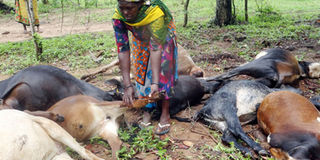Livestock movement ban imposed after animals die in Kilifi

Mama Kanze Kahindi of Kayanda village in Takaungu, Kilifi county counts her loss after cattle died mysteriously on Wednesday May 7, 2014. 198 head of cattle have so far been confirmed dead. Following the deaths, a ban on livestock movement in and out of the area. PHOTO/LABAN WALLOGA
What you need to know:
- The ban comes after the mysterious disease killed 198 head of cattle at Kayanda village in Takaungu on Wednesday.
- Livestock inspection officers had been dispatched to the area in a bid to unearth the disease which killed the cattle.
- Samples of the meat had already been taken to the government chemist in Mombasa for analysis.
- Human rights lobby group, Huria, has said that it will send an independent valuer to Takaungu to ascertain the value of the dead animals.
Kilifi County Thursday imposed a ban on the movement of livestock following the outbreak of a mysterious disease.
The ban comes after the mysterious disease killed 198 head of cattle at Kayanda village in Takaungu on Wednesday.
Speaking to journalists at Takaungu, Kilifi County officer in charge of Livestock, Agriculture and Fisheries, Mr Mwalimu Menza said veterinary officers and those from the livestock inspection unit had been dispatched to the area in a bid to unearth the disease which killed the cattle.
“We have immediately stopped movement of animals in and out of Takaungu until our officers carry out through investigations over the mysterious disease that killed the animals,” he said.
“We are deeply concerned about the families that have lost their animals that were their only source of livelihood,” added Mr Menza.
"DON'T EAT MEAT"
The officer who had been accompanied by Kilifi South Sub County veterinary officer Godrick Mwaringa also urged the locals not to eat the meat from the carcasses to avert a disaster.
“Please get my word clearly. Don’t eat the beef from the dead cattle. At this stage we don’t know what killed these animals,” he said.
“When you dare eat the meat, you will court a disaster for yourselves,” warned Mr Menza.
He said that samples of the meat had already been taken to the government chemist in Mombasa for analysis.
He added that officers from the livestock analysis laboratory in Mariakani would also collect samples of the beef for a major analysis at Mariakani.
“Let me assure the locals that we will not relent until we know the cause of the animals’ deaths. We have also started a quarantine exercise in the villages affected by the outbreak,” he added.
Mr Menza said that disinfection of the carcasses will also be done in order to prevent the outbreak from spreading.
He refuted claims from the locals that wrangles over the ownership of land could have contributed to the poisoning of the animals.
“What we are hearing are just speculations. As a matter of fact we are only waiting for the final results to determine what killed these animals,” he said.
RESULTS NEXT WEEK
The Kilifi South Sub County veterinary officer Godrick Mwaringa said that the analysis results will be released next week.
“By next week, we will be in a position to reveal the initial results of the analysis,” said Mr Mwaringa.
At the same time, a human rights lobby group, Huria, has said that it will send an independent valuer to Takaungu to ascertain the value of the dead animals.
Speaking to Nation.co.ke at Maweni village which was also affected by the disease outbreak, Huria director Yusuf Lule said he will push for the livestock farmers to be compensated for the loss of their animals.
“We have resolved to provide an independent valuer to establish the value of the dead livestock,” he said.
“In case the animals perished from poison, we shall take legal action against the culprit for the farmers to get compensation,” he added.





